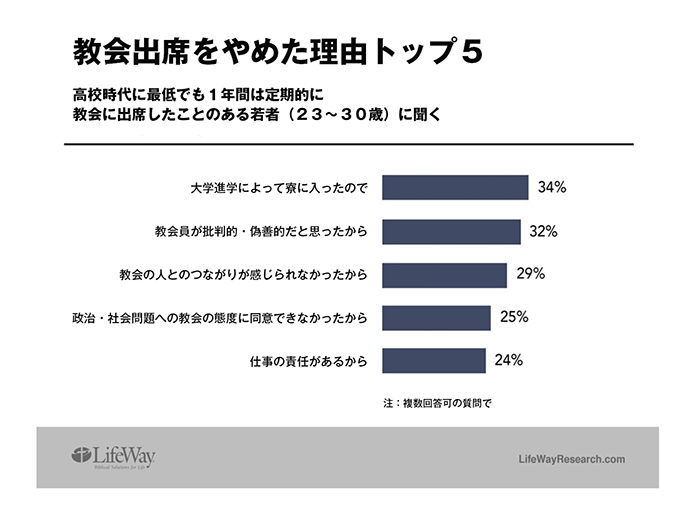高校卒業後に教会を離れる若者は少なくなったが、離れた者が抱える問題は10年前よりも深刻だ。
[toggle]Slightly fewer young adults are dropping out of church after high school, but those who do have more serious reasons for leaving than a decade ago. [/toggle]15日に公表されたライフウェイ・リサーチ社による2017年度調査結果によると、23~30歳の米国人で、「18歳になってから、最低でも1年ほどの間、毎週の教会出席をやめたことがある」と回答したのは66%。07年の調査では70%だった。
[toggle]In a 2017 LifeWay Research survey released today, 66 percent of Americans between 23 and 30 years old said they stopped attending church on a regular basis for at least a year after turning 18, compared to 70 percent in 2007. [/toggle]教会出席者の中でも、大学進学か就職によって実家を離れると同時に、日曜礼拝を欠席するようになる者が多い。ただ、一度離れた若者も、3分の2はその後、教会に戻ってくることをライフウェイ社は発見した。
[toggle]Most young churchgoers skip out on Sundays at some point amid their transition to going to college, moving away from home, or starting their first jobs. LifeWay has found that historically about two-thirds of dropouts return to services once they get older. [/toggle]しかし近年、若いクリスチャンが教会から離れる理由に、政治的・霊的懸念が挙がるようになった。2017年、そうした信念によって教会を去ったと回答したのは70%で、10年前には半分ほど(52%)しかいなかった。
[toggle]But these days, young Christians are more likely to cite weightier political and spiritual concerns as pushing them away from the church, with 70 percent listing such beliefs as a reason for their departure in 2017 compared to about half (52%) 10 years before. [/toggle]高校時代に1年以上、プロテスタント教会に定期的に(1カ月に2回か、それ以上)出席したことのある若い米国人2000人以上に調査した結果、若者が教会を去る理由として「大学進学」がトップであることは、どちらの調査でも変わらない。
[toggle]Moving for college remains the top reason young people stop attending church in both surveys, which are based on responses from more than 2,000 young Americans who attended a Protestant church regularly (twice a month or more) for at least a year during high school. [/toggle]
以下のような回答もあった。「教会員が偽善的だと感じたから」32%、「教会生活から離れたから」29%、「学生ミニストリーがない」24%。
[toggle]Other popular reasons to include: a perception that church members were hypocritical (32%), disconnect with church life (29%), and lack of student ministry opportunities (24%).[/toggle]若いクリスチャンと他の教会出席者の政治的な亀裂も大きくなっている。教会出席をやめた理由に「政治・社会問題への教会の態度に同意できなかったから」と回答したのは、教会出席をやめた人の4分の1(25%)で、2007年の15%を大きく上回った。
[toggle]Political rifts between young Christians and their congregations are growing. A quarter (25%) of recent dropouts said disagreements over their church’s stance on political and social issues contributed to their decision to stop attending, compared to 15 percent in 2007. [/toggle]2016年の大統領選を受けて、追加の調査が行われることになった。ジェネレーションZ(1990年代後半から2000年代にかけて生まれた世代)の間で、人種や社会正義、LGBTの権利に対する関心が急激に高まる中、ドナルド・トランプ大統領の勝利によって支持政党が分裂したからだ。
[toggle]The follow-up survey came in the wake of the 2016 elections, with partisan divides over President Donald Trump’s victory adding to Generation Z’s growing concerns around race, social justice, and LGBT rights. [/toggle]「過去には、このような難しい問題はわきに追いやられ、その後もずっと言及されることはなかっただろう」と語るのは、ライフウェイ・クリスチャン・リサーチ社の学生ミニストリー局長ベン・トゥルーブラッド氏。「しかし、そのようなアプローチでは、学生ミニストリーを台なしにしてしまう。いま学生ミニストリーの指導者は、そういった問題について聖書にはどう書いてあるかを教えなくてはならない。そうすることによってティーンエージャーは聖書的な対応ができるようになるのだ」
[toggle] “In the past, it was possible for difficult issues like this to be brushed aside or go unaddressed entirely,” Ben Trueblood, director of student ministry for LifeWay Christian Resources, told CT last year, responding to trends among Gen Z. “But that approach cripples the purpose of student ministry. Now, student ministry leaders are forced to teach what the Bible says on these issues, as well as equip teenagers to respond biblically.” [/toggle]カルヴィン大学の哲学教授であるジェームス・K・A・スミスが語ったように、多くの教会が「政治的に志が同じで、予測可能な団体」である時には、イデオロギーが異なると感じる人は一緒にいるのが困難だろう。昨年、「クリスチャニティ-・トゥデイ」が報告したように、トランプが選出された後、教会出席者はどの年齢層でも減った。特にヒラリー・クリントン候補を支持していた人たちは、「あまり教会に歓迎されていない」と感じることも多かっただろう。
[toggle]In a time when many churches are “predictable clusters of the politically like-minded,” as James K. A. Smith has said, it’s harder for those who feel like ideological outliers to stick around. As CT reported last year, church attendance dipped among born-again and evangelical Christians across age groups after Trump’s election, particularly among Hillary Clinton supporters, who may have not felt welcome in certain church contexts. [/toggle]若い人たちは政治的信念や霊的信仰を共にする仲間を探すため、むしろ教会の外へと出てしまっている。ある者は一時的に、ある者はずっと。高校卒業後、多くの若者は大学キャンパスで自分のコミュニティーを見つける。
[toggle]Young people—some temporarily and some permanently—are moving outside churches to find a cohort that shares their political and spiritual beliefs. After high school, many find that community on campus. [/toggle]定期的に教会に出席することをやめた理由が「大学進学によって寮に入ったから」としたのは、07年の調査では、18歳から22歳までの若者の4分の1だったが、17年では4分の3だ(大学に入学した若者で寮に入るのはほぼ半分の47%)。
[toggle]A quarter of 18- to 22-year-olds in 2007 and a third in 2017 said they stopped attending church regularly simply because they “moved to college.” (Among young adults who had enrolled in college, that number is up to nearly half—47 percent.) [/toggle]それでも実際に「学業が理由で教会に行けなくなった」と答えたのはたった14%で、「仕事の都合で教会に行けなくなった」と答えたのは24%だった。
[toggle]Still, only 14 percent said their school obligations actually kept them away from church, compared to 24 percent that said their work responsibilities prevented them from going. [/toggle]他の調査によって、大学出席と信仰の後退には関わりがあることが明らかになったが、それは教授や講義のせいではない。むしろ、実家暮らしから独立したことや、広い意味で「大学を経験したこと」によるところが大きいだろう。青年期特有の健忘症ということもある。
[toggle]Other studies have noted a clear correlation between college attendance and decreased religiosity but find the decline in faith isn’t the fault of professors or classes themselves. Rather, it may be due to the “college experience” more broadly or the transition from one’s family home to a new independence. There is also plain teenage amnesia. [/toggle]「その多くは教会を否定しているのではない。大部分が単に教会を見失い、自分の人生にとって大切なものとは思わなくなっただけだ」。そう語るのは、ホイートン大学ビリー・グラハム・センター研究所の最高責任者で、ライフウェイ・リサーチ社の最高責任者だったエド・ステッツァー氏だ。(後編に続く)
[toggle] “It’s not that most rejected the church,” wrote Ed Stetzer, former executive director of LifeWay Research and the current head of the Billy Graham Center at Wheaton College. “For the most part, they simply lose track of the church and stop seeing it as important to their life.” [/toggle]